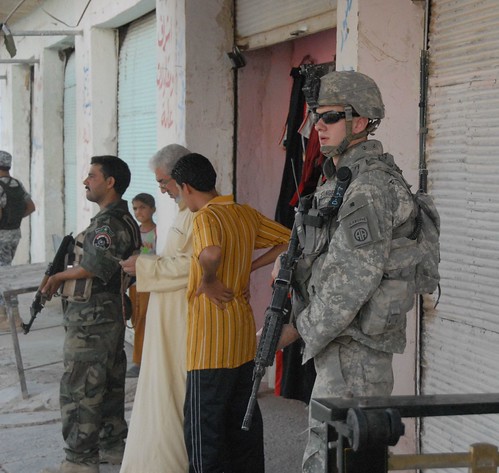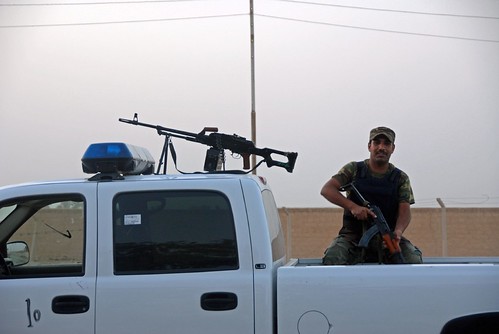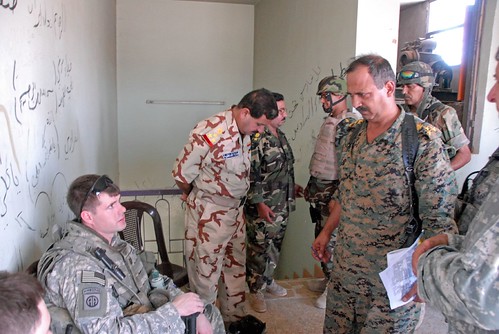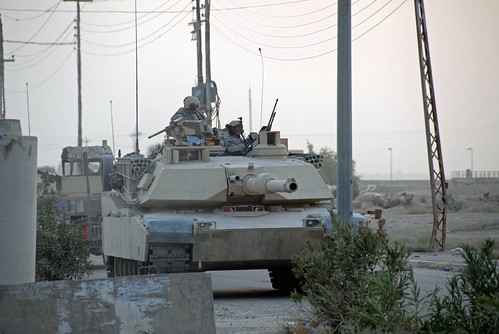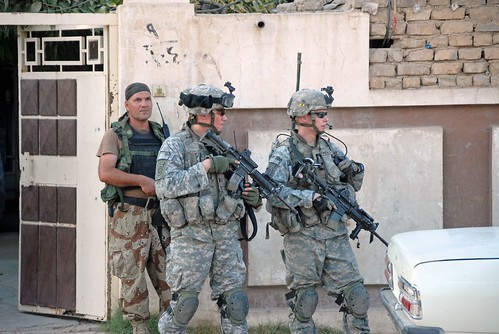Raids, Ramadan, and Supporting Iraqi Police as they Perform their Own Missions
September 23, 2007
Samarra, Iraq -- Though they are roughly a month from heading back to the States (after their grueling 15-month combat tour), Captain Buddy Ferris, commander of Charlie Company of the 82nd Airborne's 2-505 Parachute Infantry Regiment, hasn't allowed his unit's preparations for redeploying (or for being replaced by the 101st Airborne) to slow down their operations tempo. Despite the "short-itis" being felt by many in the Company, the platoons which are not on Force Protection or QRF duty are still pushing out of Patrol Base Olson and into Samarra at least once per day (often more).
Ramadan is well underway in the Islamic world. This past week has involved some joint patrols and operations, but has primarily featured, at its center, operations planned and conducted almost exclusively by the Iraqi and National Police in the area. These Iraqi Security Forces (ISF) planned and executed three major operations in the city, locking down large sections of houses and industrial buildings and searching them for weapons and hostile personnel. Between the three, the ISF detained nearly fifty individuals and impounded several vehicles. Some of the people were subsequently released and returned home, but others were kept for questioning. Some of these were found to be very high level targets in the area, including a key figure in an al Qaeda rape and terror cell, which was broken up by the ISF during the course of one of these missions.
The role played by the coalition during these Iraqi-led missions is a supporting one. Both the NPTT (National Police Training Team) and 82nd Airborne personnel provide advice during the initial planning process (including imparting such pearls of wisdom as, "You might not want to engage the enemy from both sides of an open area because your troops will, as a result, be shooting at each other"), but are extremely tactful and diplomatic with it, both by making suggestions instead of giving commands, and by making their suggestions sound as if they are simply reinforcing the ISF commanders' ideas, rather than correcting their errors. The cooperation (and teaching) goes all the way to the top of the chain of command, with Major Travis Southwick serving as the CPATT (Civilian Police Assistance and Training Team) advisor to General Rasheed, the commander of Iraqi and National Police in Samarra.
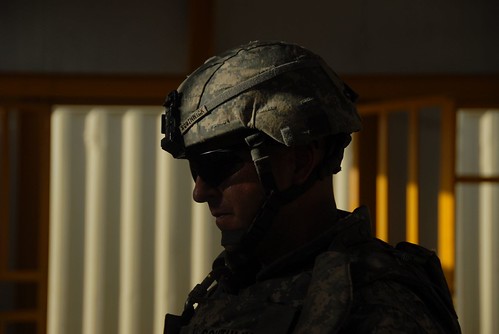 |
On the most recent NP operation, Captain Ferris suggested to General Raad, the director of Operations for Samarra's ISF, that he use symbols on the map in his operations center to show where his forces were during operations. Explaining that he hadn't used such things before because he already knew where his men were located, Raad responded to the explanation that his officers also needed such information by declaring that, on the next mission, he would be "making symbols and teaching his young officers how to use them."
Even when performing their own missions, the ISF prefer to have the comfort of a coalition presence in the area. One platoon will often help the NPs on the 'outer cordon' (perimeter) of the area in which the NPs are operating, providing security and peace of mind to the Iraqi forces.
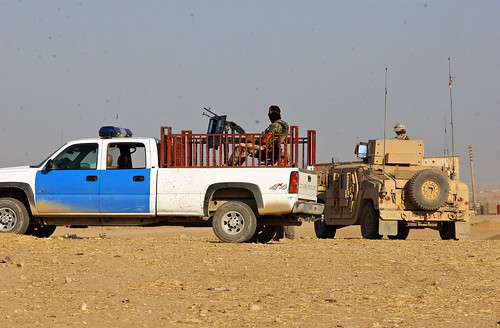 |
The Iraqis' favorite thing to ask for when performing operations is American tanks. "No matter how many we offer, they'll ask for two more," Ferris said. "They'll ask 'How many tanks are you bringing?' and if I say 'Twenty,' then they'll demand twenty-two." Three to four tanks are generally brought down from the 2-505 PIR headquarters at Forward Operating Base Brassfield-Mora for Iraqi missions (as well as, occasionally, for joint patrols).
When operating outside of the direct supervision of American troops, the Iraqi Police are less disciplined and perform at a consistently lower level than they do when accompanied by coalition soldiers. They are generally good for about two hours of work before they lose focus, and, when there is no action, are quick to drop their guard, light cigarettes, and stand around all too casually (they also take to cameras like a beagle does to a scent - as soon as they see me taking photographs, all thoughts of patrolling and pulling security are driven out of their heads, and replaced by the need to pose for photographs). Iraqi NPs are also renowned for their "death blossom" -- the 360o field of fire that every man seems to create when engaged by the enemy (something which results both in a large number of friendly-fire casualties, and in dismounted coalition forces in the area hitting the ground until the NPs are finished firing in every direction).
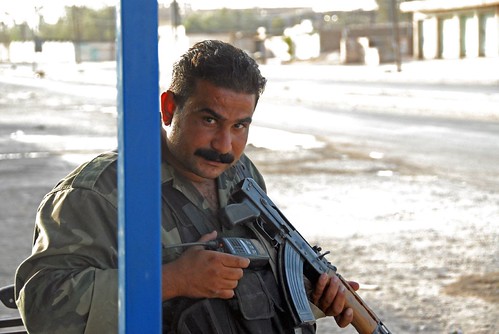 |
On joint patrols, the NP performance is acceptably adequate, although there are mental mistakes - such as forgetting to cover a corner for the next man when crossing an intersection - that I've seen them make with great regularity. Though the average "Joe" in the US Army is young and lacking in so-called "life experience" (something that I'd debate, in the case of those kids who have been baptized by the fire of fifteen months of daily combat), the pride, discipline, and efficiency of the American soldier is simply on a different level than that of the Iraqi soldier or policeman, from their ability to think for themselves, to their ability to follow orders, to their placing of personal comforts and desires behind duty's requirements, even in the face of grave danger and death.
The rest of this week has involved going on joint patrols - mounted and dismounted - of various parts of Samarra, as well as almost nightly raids on the houses of enemy IED emplacers. The city has largely been quiet; there have been some mortars fired at our patrol base, and we took some small arms fire on a patrol a day or two ago (with Red platoon, after finishing the dismounted part of our patrol and while driving back to Olson), but nothing big has happened on the coalition side of the fight (though there was an interesting afternoon this week when the Patrol Base almost burned down, as one of the paratroopers here, distracted by his desire for an unusually appetizing dinner, failed to monitor the fire in the 'burn' latrines, leaving the flames to spread like wildfire across the reeds lining the Tigris and the back of the base).
However, despite the apparent lull in enemy offensive operations, Charlie Company's leadership has been busy diligently developing intelligence and targets for future missions, and maintaining readiness for when the city wakes up again. The paratroopers here are preparing to return home after a full deployment plus a Robert Gates-inflicted extension spent (literally) in daily contact and combat; however, though nothing is desired as much as getting every one of these young men home safely, Charlie Company's leadership - which has endured the deaths of nine of their comrades on this rotation - will not allow the enemy to get a reprieve simply because of an impending rotation of American units.
***************
This mission is 100% funded by reader donations. If you would like to help continue to make this reporting possible, please consider clicking the PayPal link on the right sidebar and making a contribution. You can email Jeff at InsideTheSurge@Gmail.com.
